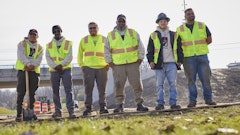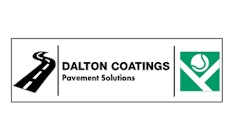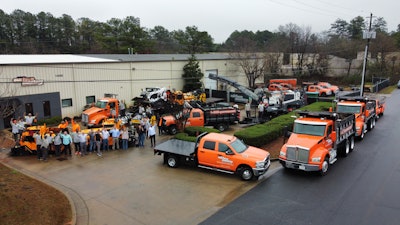
Ten years ago, Justin Meier was at a crossroads in his career. With college in the rearview and law school the plan for the future, Meier took LeeBoy is sponsor of the 2022 Contractor of the Year Award.
LeeBoy is sponsor of the 2022 Contractor of the Year Award.
“There was a crew out there painting lines in the parking lot and I had never seen that done before,” Meier says. “I didn't know what striping was. I didn’t know what sealcoating was. But I knew these guys didn't look very professional. Their shirts were off, the truck was banged up, the equipment wasn't well kept up, and I remember that struck a chord with me. These guys are out here striping this really nice shopping center looking like this and I wondered how they got that work.”
So Meier did what anyone does when they want to learn something these days, he went to Google. Luckily for Meier, he found the National Pavement Expo and unknowingly started a business that would lead him to become Pavement’s 2022 Contractor of the Year.
Today, the Atlanta-based contractor completes about 700 jobs a year with a 65-person team, all of which happened through hard work, dedication and quite a few learning curves.
Trial & Error: A Lesson in Essential Education
Successful contractors know that continual education is key to sustaining and growing a business. For Meier, it was, and has continued to be, essential to guiding his business forward. He attended his first National Pavement Expo (NPE) in 2010 to learn more about the business and has made it a point to attend the show as much as he can since.
“I have been a big advocate of NPE,” Meier says. “We go up every year and take classes. I also have relied on the networking the show provides. I’ve never been afraid of talking to veterans who have helped me from day one and that I can still call to this day to ask questions if I need to.
After NPE, Meier started making phone calls to managers of shopping centers. Still, with no equipment and really no idea what he was doing.
“When I got my first contract striping five Kroger shopping centers, I went to my local Sherwin Williams,” Meier says. “They were doing a six month, 0% financing on Graco equipment and that’s where I purchased my first piece of equipment, a Graco 3900.”
It was this piece of equipment Meier used to complete his first contract. Meier credits the Graco salesman for a successful first job.
“Danny Shirley was his name,” Meier says. “He showed me how to use the machine when I went to pick it up the night before I started my first job. He showed me how to use the machine by pumping water through it. I remember being so nervous to pull the trigger on the first line. After that, it was really through trial and error that I learned how to stripe.”
Meier was seeing some success doing this work and hired some of his friends from college to help complete more projects with him after hours.
“At first, I wondered if I could do this through law school,” Meier says. “Working like this went on for about six months and I realized that I could always go back to law school. So I decided to push it off and went headfirst into the business after a few of our customers asked if we could complete some sealcoating work for them.”
Again, Meier leaned on his local dealer to help him break into this side of the business.
“I went to the local SealMaster and that owner at the time, Dick Loughman, walked me through how to sealcoat, how to calculate how much sealcoat you're going to use, etc.” Meier says. “He taught me a little bit about the sealcoat equipment and how to operate it. From there, I decided to purchase my first sealcoat machine and started sealcoating as a service.”
At some point, you have to decide if you’re going to continue with a few odd jobs to pay the bills or go full throttle into something worth growing. Meier quit his day job and officially opened The Surface Masters in 2011.
At that time, Meier was selling all day and working with a crew at night to complete the work.
“As I started doing this full time, I wore all hats; sales, estimating, labor, project managing, clerical work, invoicing,” he says. “As we got busier and busier, I was able to hire in a crew and then it turned into two crews and so on. A few years into the business running like this, I decided to hire some office help and a project manager. This allowed me to focus on the sales side of things and really try to grow the business. We're now running five seal crews every day and I think we’re actually ready for two more."
As the sealing and striping work grew, The Surface Masters naturally started subcontracting more and more asphalt work to be completed prior to their sealing and striping services which Meier looked at as another opportunity for growth.
Scaling Growth: Processes Keep Pace
For many contractors, this type of growth is a blessing. Contractors who have been around awhile and continue to prosper know that any growth you see must be controlled and scaled for your business needs.
Meier knew very early on in his business that he wanted to grow, and was adamant about defining processes for the sales and operations sides of the business that would maintain the level of proficiency and professionalism he knew would retain customers.
“Everything that I did, I wanted to do in a way that I could scale it and that was all processes,” Meier says. “On the sales side when I was selling or on the operation side when I was striping or sealing, I had protocols that I put in place. These were basic step by step processes that I implemented by going through the actions myself as a novice. I developed processes from the inexperienced rep’s perspective because that’s what I was. I didn’t grow up in the industry or have a past job within the industry where I learned how to do these things.
"I went through the process and learned the do's and don'ts through the school of hard knocks," Meier adds. "So for example, with the sales, I had my own process of how to prospect, how to inspect parking lots, what to look for and how or when to follow up with customers. And so over the years I've been able to really critique those processes so all the people who join our team, work through the same protocols or processes that I put in place, regardless of experience.”
By doing this, Meier knows that he can hire people for attitude fit rather than experience, a blessing in our current labor market.
“My goal throughout the years of building these processes was because I didn't want to have to go after experienced people because that's very difficult and expensive,” Meier says. “I designed a process to hire for attitude, not skill. And that's my biggest thing. I can go out and hire someone who's going to fit our culture and then they can easily just take off with the processes that we've laid out.”
As the company continues to grow, Meier and his team are also continually changing how they work.
“At every stage that we grow, there is a new set of problems that you have to re-scale,” Meier says. “We fixed the problems that we faced when we were a $2 million company, but then you reach a different set of problems when you grow to a $5 million company, then a $10 million company and now a $15 million company. You have different sets of problems at every single stage of the business and you have to be honest with yourself and understand the strengths and weaknesses of the company and constantly critique your processes in order to improve otherwise you risk becoming stagnant or growing too fast and losing control. We don’t want either of those things.”
Paving: A Whole New Ball Game
In 2018, Meier started to think about bringing paving into The Surface Masters portfolio of work.
“As we grew organically, we were subcontracting out more and more paving,” he says. “I started looking at those numbers and realizing we could afford to bring this in house. My problem was, paving is a completely different business than sealcoating or striping and that was something I had to be extremely careful about bringing in-house due to the many more variables paving presents vs. sealing or striping. Although its not rocket science, it certainly isn’t as simple as sealing and striping and I couldn’t afford to bring it in-house in the same ‘trial and error’ fashion as the sealing and striping. As a result, I started looking for someone with experience to run that division and they came in and started us out.”
From there, just as the company naturally started to subcontract more and more paving as the sealing division grew, the company also naturally was began subcontracting out more milling as the paving division grew and decided to bring that service in-house last year as well.
“As the company grows, being able to continually rely on industry veterans has helped me tremendously,” Meier adds. “To be able to get their guidance or their input or their opinions or experiences throughout the various sizes of their businesses has been instrumental to my success. If I was afraid to pick up the phone and ask these questions, I don't think my business would be where it is today. If I was not able to ask those questions, and have them freely share with me.”
COVID: Another Lesson in Diversification & Growth
The past few years have been a struggle for every business and the pavement maintenance industry was not immune. Supply shortages, increased labor costs and dwindling demand for services caused even some of the best companies to tighten their belts, or even worse, give up. Many companies relied on their solid relationships to keep things afloat during the most challenging times.
Our biggest thing is we want to get to understand the client,” Meier says. “We believe our clients should spend more time attracting tenants, residents, customers, etc. and keeping them happy and leaving their parking lot up to us. We want to understand their business plans. We want to know what their goals are for their portfolios. Will they be selling the property in three years or are they going to be holding on to it for 10 years? That will determine our plan of action for them and it’s up to our sales team to maintain those relationships and they do a great job of it. We don’t just want to do the work they need done now, we want to understand their business goals too in order to help them plan for the future and that client knowledge and understanding has helped us in the last two years.”
The Surface Masters have a history of providing long term pavement maintenance programs to their customers and relied on that to keep them going at the onset of the COVID-19 pandemic. They were able to work on city and county parks until they could formulate another plan to keep their crews busy.
“A lot of our apartments and retail center projects got canceled, or at least postponed, and a lot of them never came back,” Meier says. “In the Atlanta market, and probably nationally, I noticed a lot of the maintenance work was getting put on hold. 2020 was the first year in business that we did not major see growth. We knew it would rebound but we also wanted to future-proof our business too.”
So COVID provided another opportunity for The Surface Masters to diversify.
“For the first nine years in business, I purposefully stayed away from most general contracting work and all new construction, but when the pandemic hit, that’s where the work was,” Meier says. “That forced me to say ‘you know what, shame on me.’ I did not see this, but that is the importance of diversification.
“We ended up diving into some new construction work in 2020 during the pandemic since that sector was still booming and the retail market slowed. As a result, new construction now makes up about 10 to 20% of the business’s revenue,” Meier adds. “We still would prefer to work for the portfolio owners and managers, however, we have opened it up to a little bit of GC and new construction work and that was purely for diversification purposes that came to light during COVID last year.”
Another positive that came from COVID? Talent acquisition. Finding help has been increasingly difficult in this very competitive and costly labor pool, but some companies closed their doors or downsized in 2020 which left room for other companies to make some key hires.
“Although we had a little bit of a down year growth-wise, the year of the pandemic was a big year for us because we had a lot of our competitors and/or industry manufacturers letting go of really good people, including some operations and sales talent,” Meier says. “No one knew how long we were going to be exposed for, which is why they were letting people go, but I was confident in our company’s vision and ability to absorb the pandemic’s blow and went ahead and scooped them up and that which has paid dividends this year. COVID gave me the opportunity to diversify our market sectors as well as to scoop up some really good talent and really good people who fit our culture.”
This year, The Surface Masters grew at a rate of 80%, a true testament to dedication through adversity by Meier and his whole team.
“When I was looking at getting into the business and hearing about these awards back in 2010, I remember thinking ‘man, that would be cool one day to be a part of that,’” Meier says. “A lot of our people who bought into the vision years back, most of them are still with us today. So, here we are 10 years later and those people are the reason we’re here. Obviously, it's a team effort and I've been very, very fortunate with the team that we have.”
The best part of all this? Meier and his crew have maintained that very first Publix parking lot, the one that made him curious as to what our business was all about, for the last 10 years. Congratulations to The Surface Masters, Pavement Magazine’s 2022 Contractor of the Year.





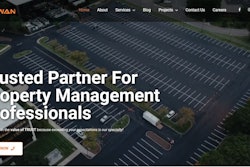
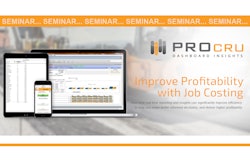





![Lee Boy Facility 2025 17 Use[16]](https://img.forconstructionpros.com/mindful/acbm/workspaces/default/uploads/2025/09/leeboy-facility-2025-17-use16.AbONDzEzbV.jpg?ar=16%3A9&auto=format%2Ccompress&fit=crop&h=135&q=70&w=240)



